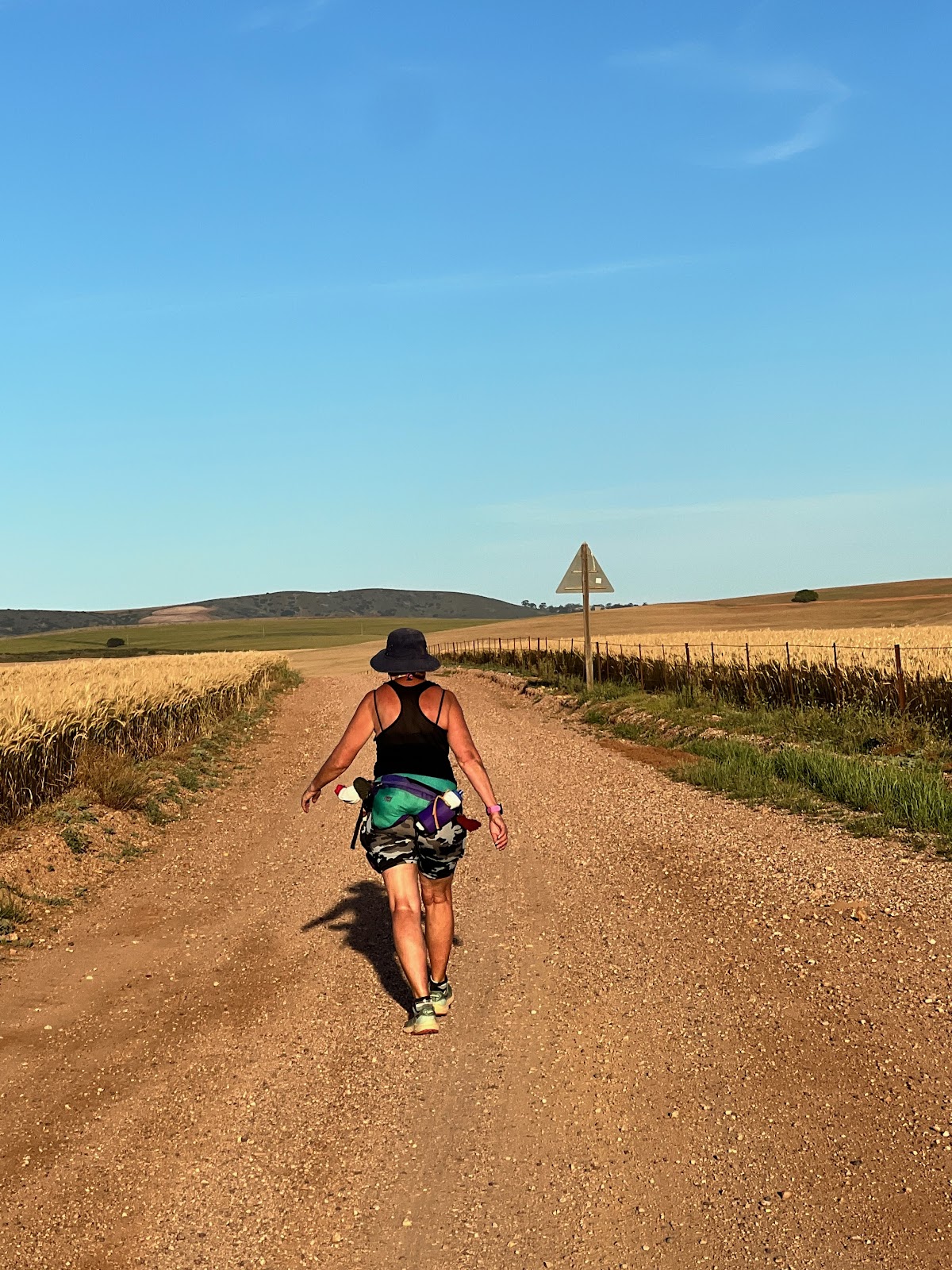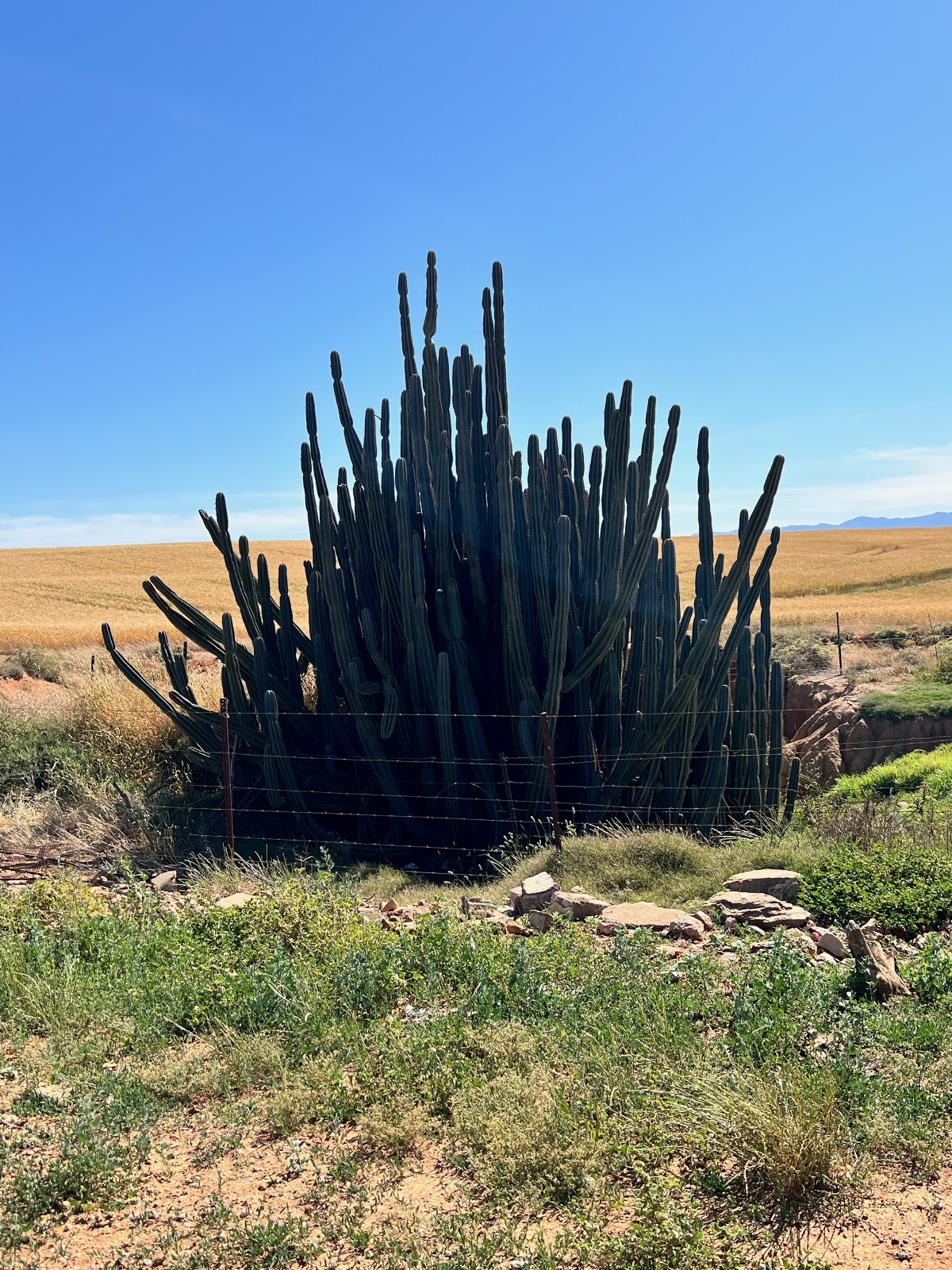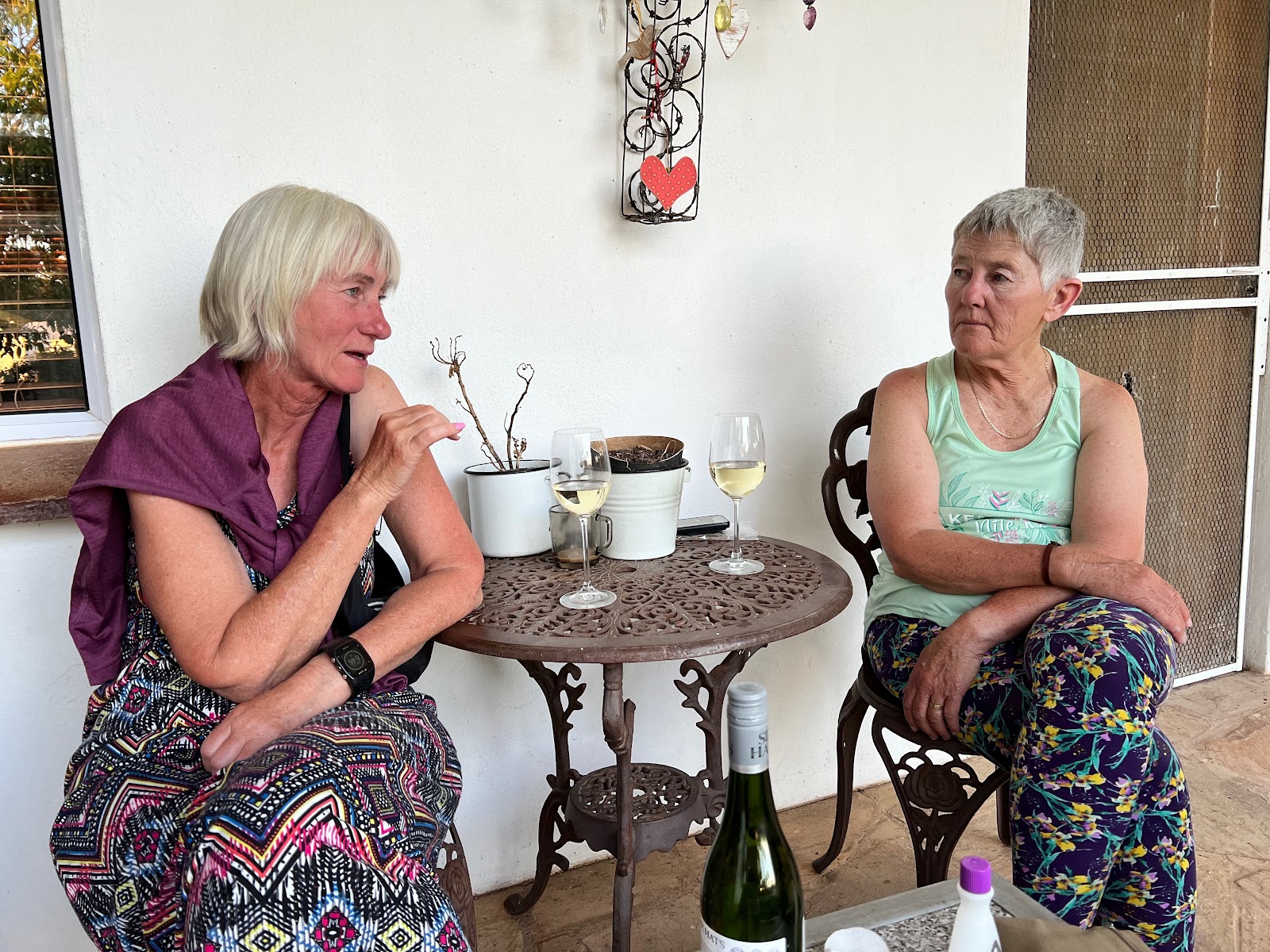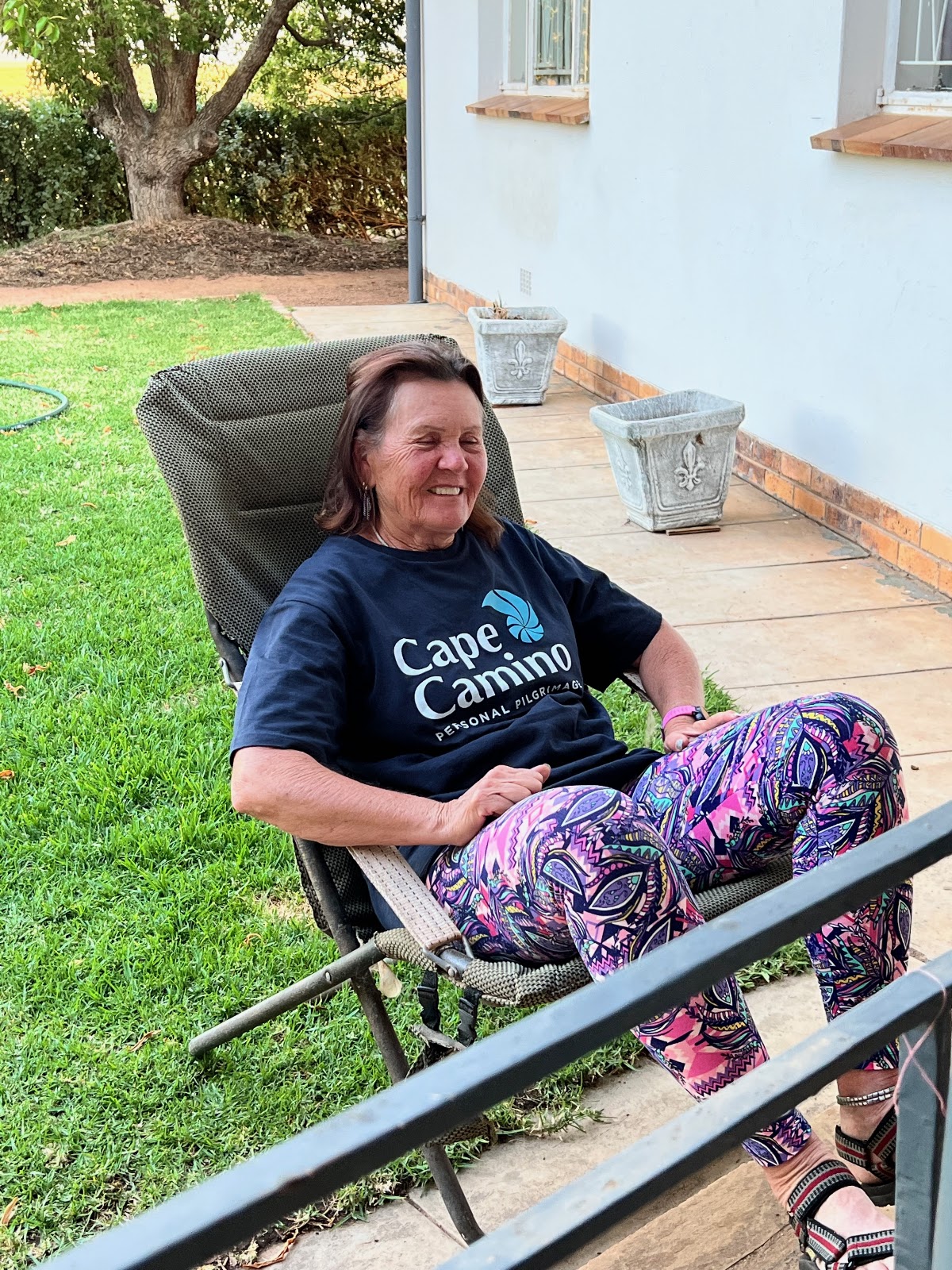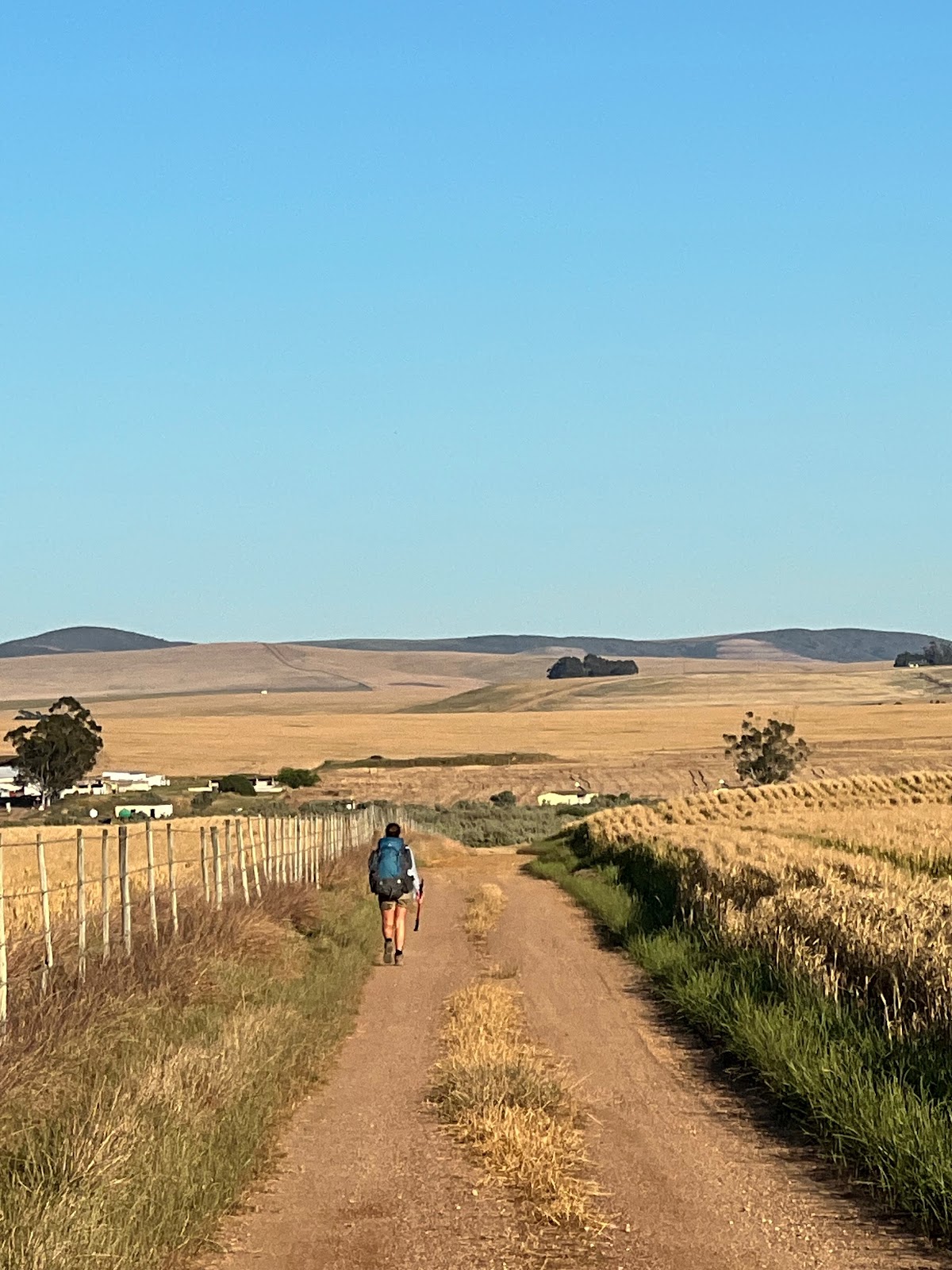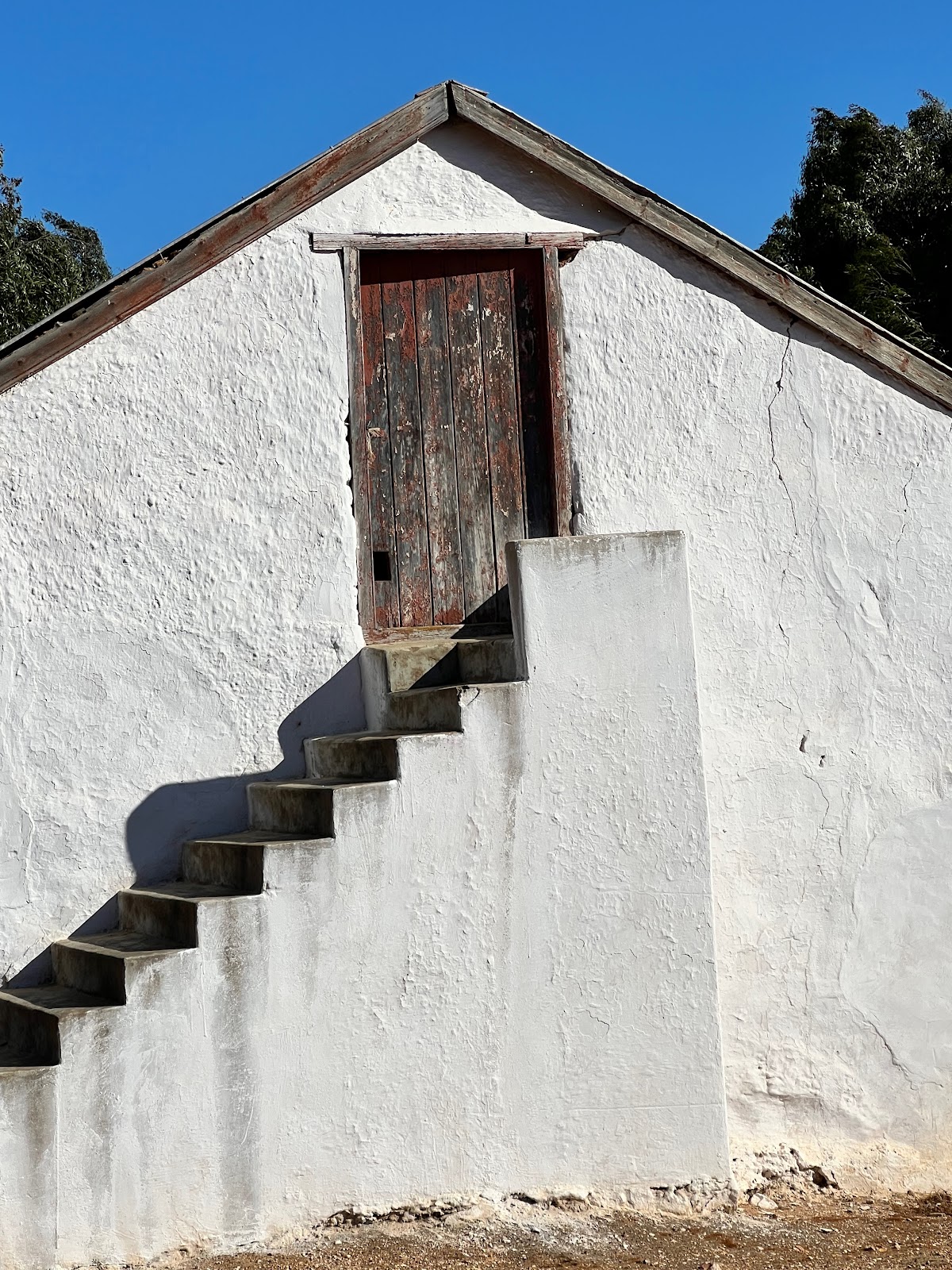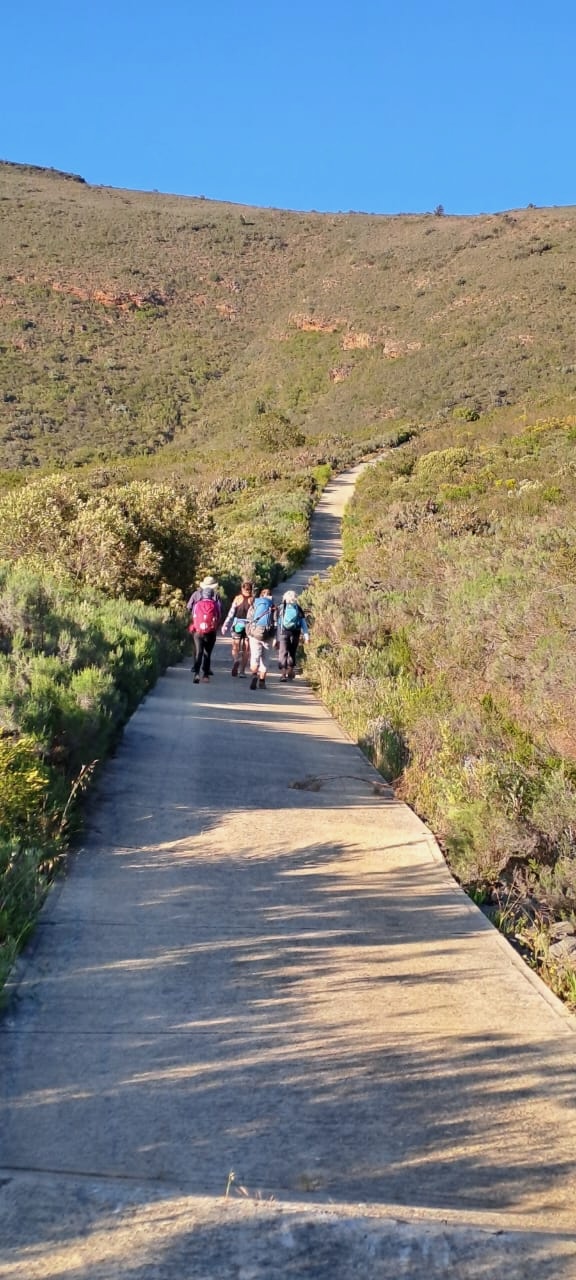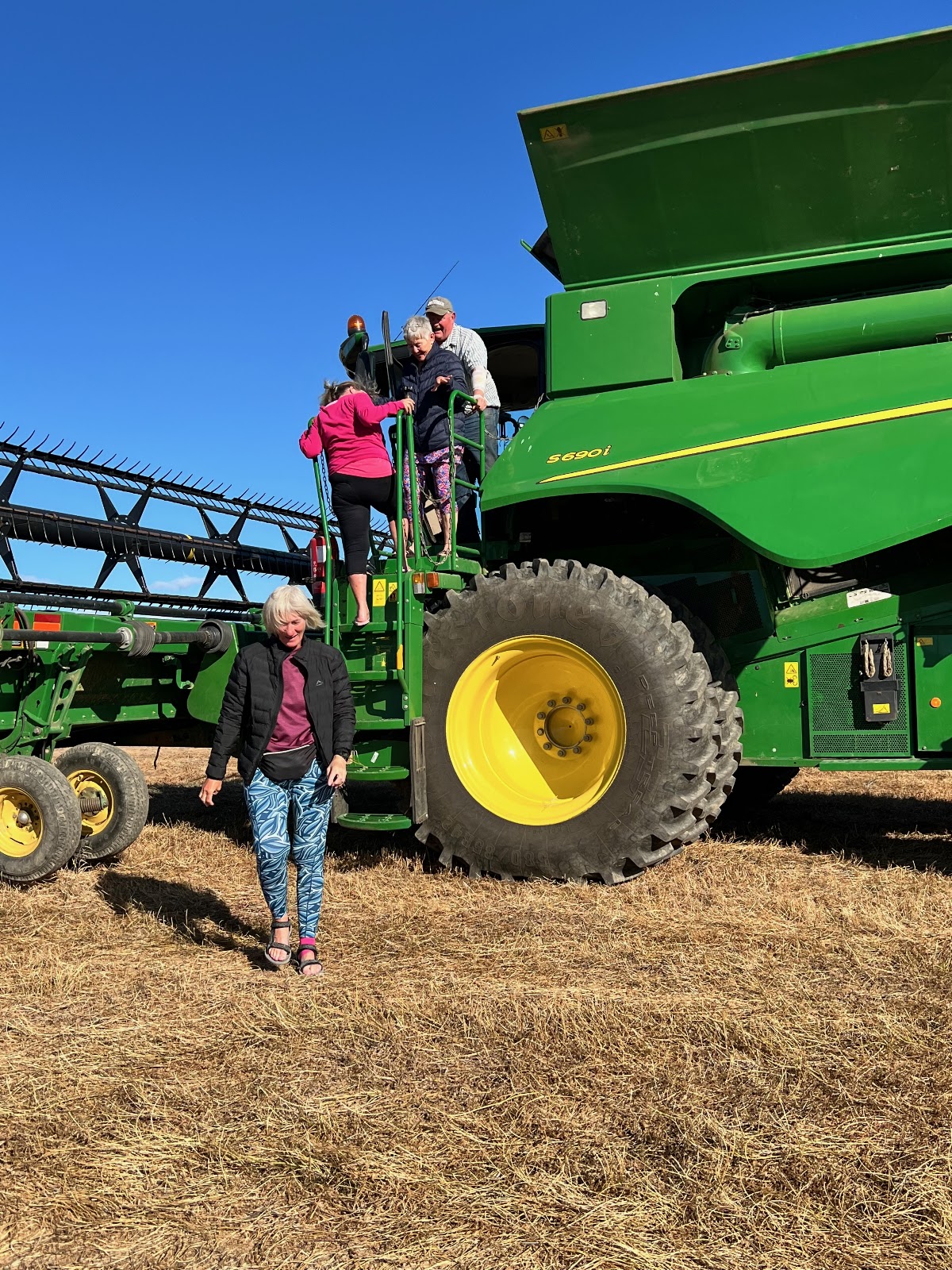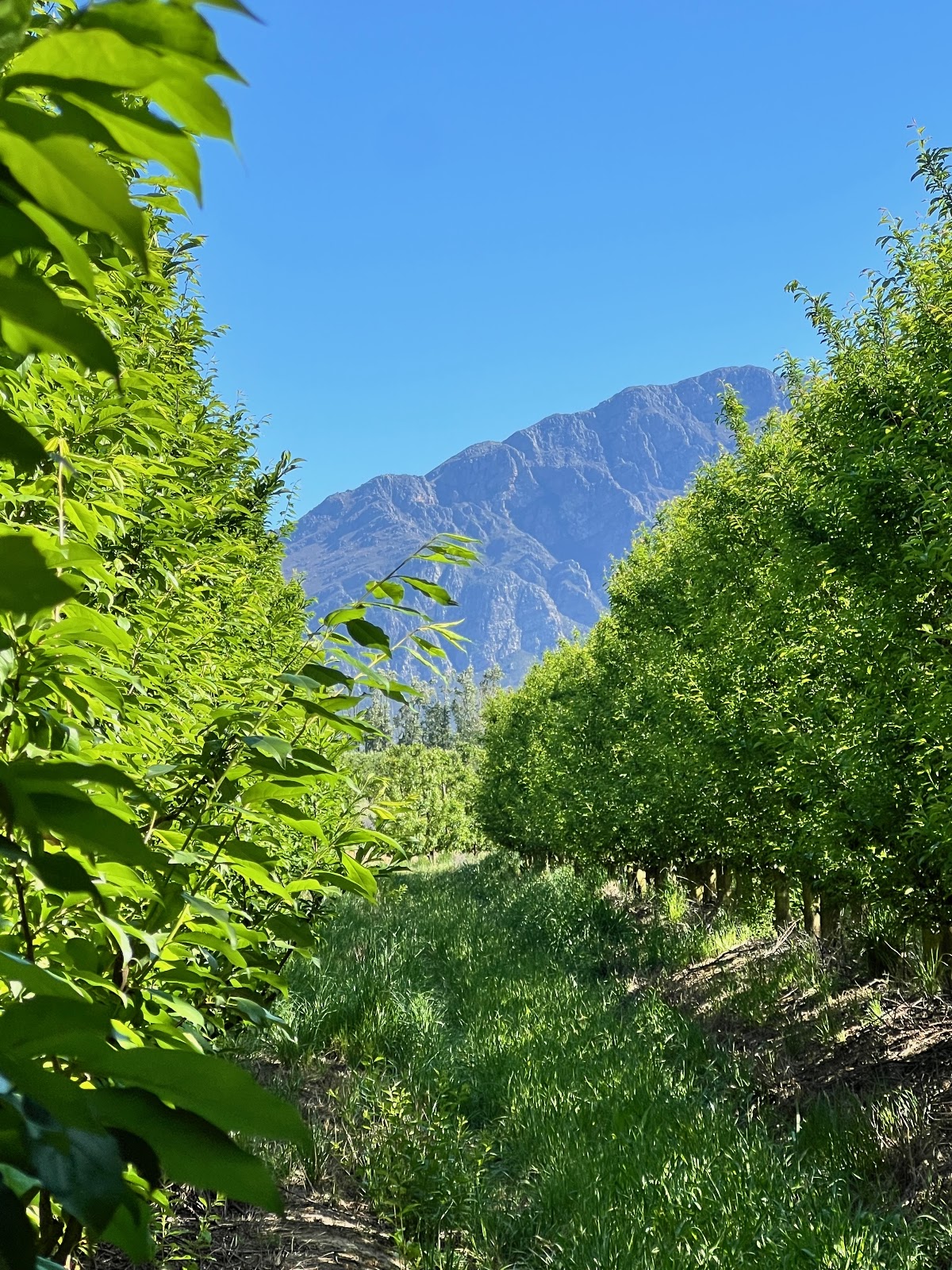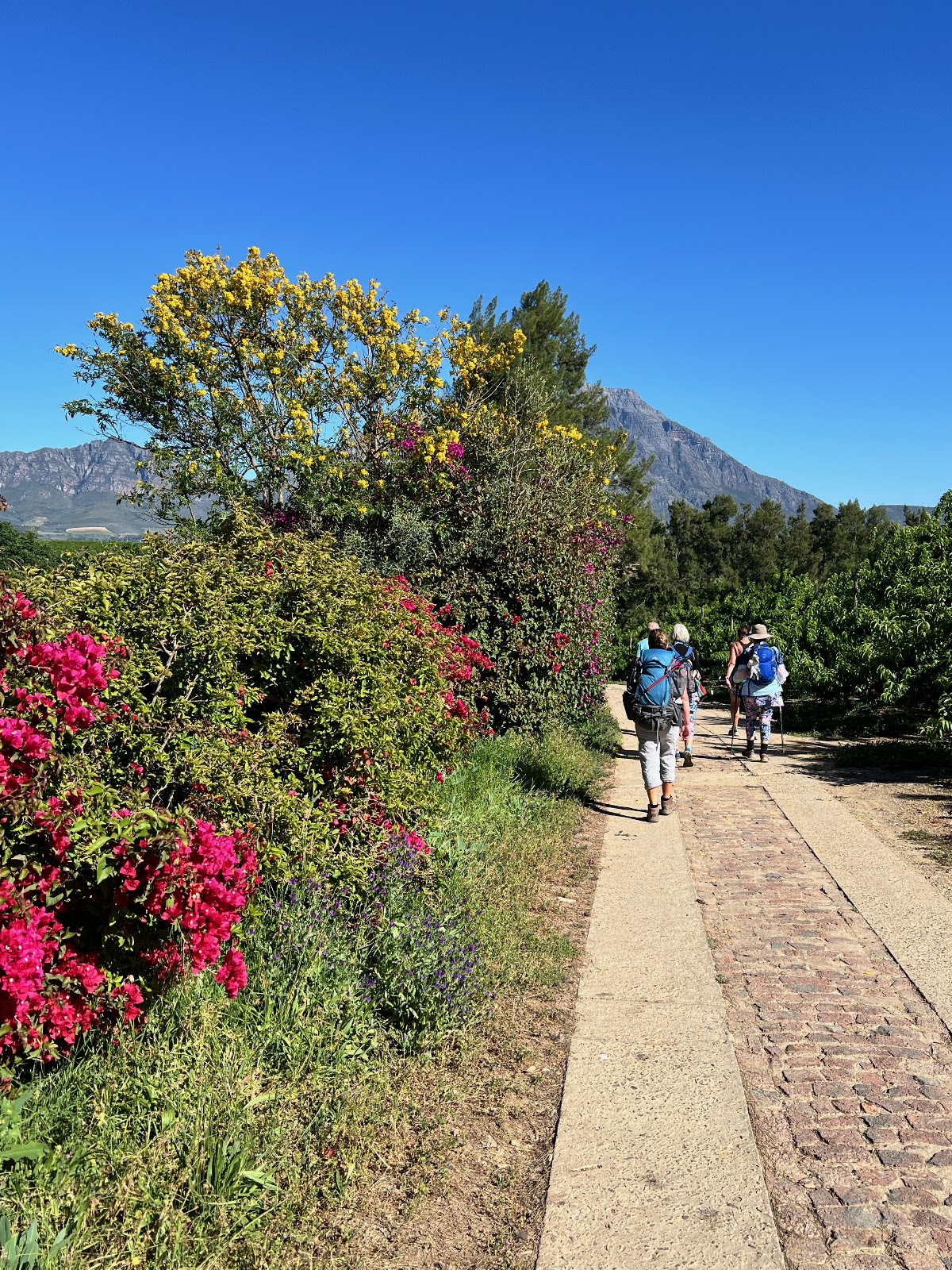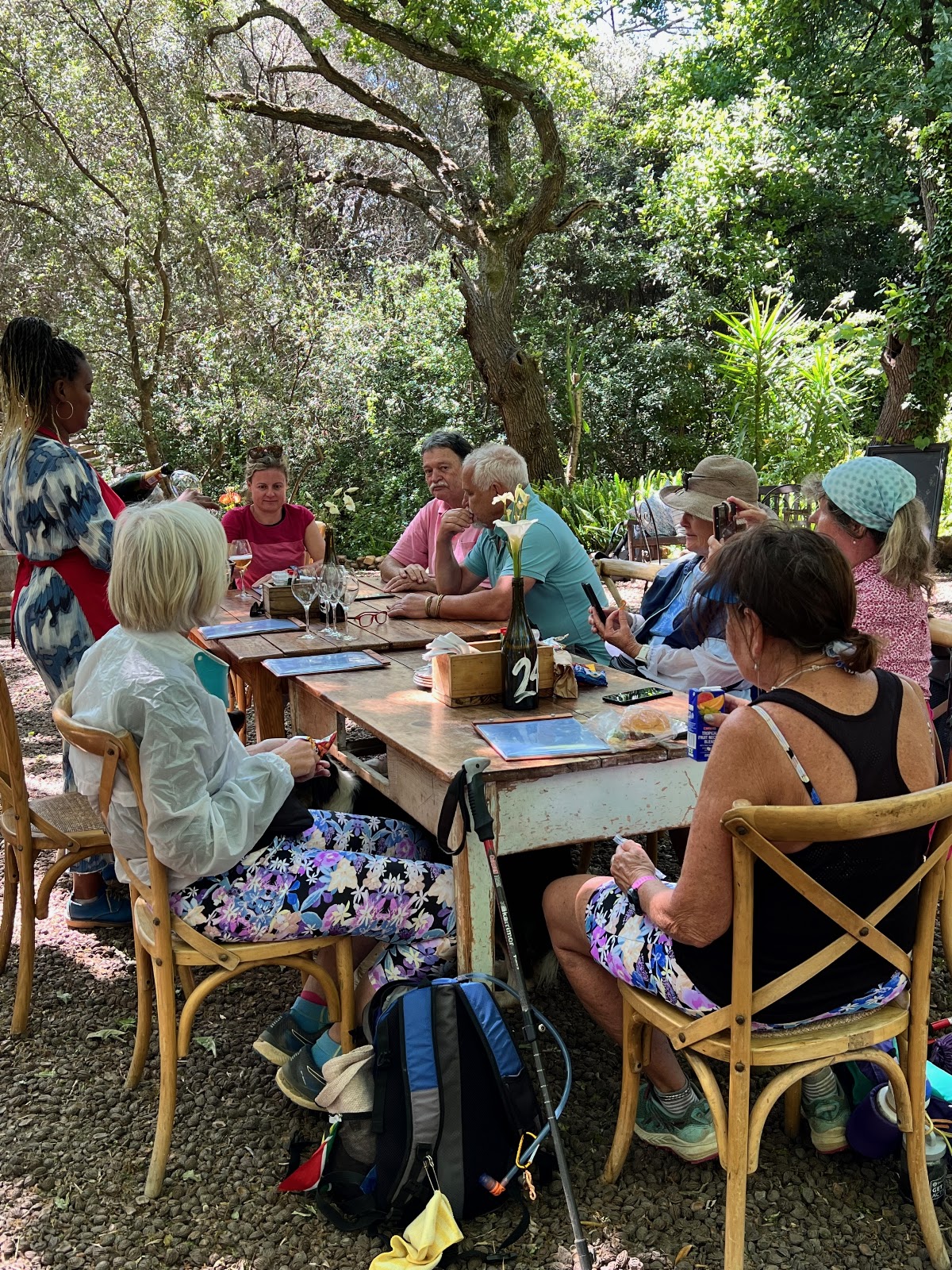Wednesday, October 23
Nuwefontein to Soutkloof
24 + 5k/18mi
Hot! 36C/97F
I was nearly giddy with joy when I set out on this morning. We were to leave by 6:00 because of the expected heat. N. had decided it was my turn to leave first, to have the pleasure of a road stretching out in front with no one else there. Cynthia had said she wanted to go at the back, her own way of finding solitude, and of showing kindness to A. There was no chaperone again, and we’d been promised good waymarking. Marina offered an app that showed directions, but I couldn’t access it on my phone, so the way ahead of me was mine alone.
After packing my lunch and saying goodbye to Marina, I set off down the stairs at the side of the stable before anyone else knew I was leaving. The light was magical and the air fresh and invigorating. I watched sheep on a hill in the distance, marveling at the colors of dawn light. I walked fairly quickly, enjoying the feel of my legs setting the pace without restriction, wanting to put space between me and the friends, wanting that rare gift of alone time more than anything.
When I stopped to watch the sheep, I looked back, and saw Wendy coming up the road behind me. Fast. I moved forward, trying to stay ahead of her, but had to stop and pee, so she caught up. I told her I was wanting alone time this morning, but that she was welcome to walk ahead of me. That was a concession I gave reluctantly, not really wanting to give up the open space ahead. She seemed a little taken aback, but said she just wanted to walk. I thanked her and we proceeded, with her just slightly in front. She was close enough that conversation was inevitable, and I eventually gave up the thought of it being a solo day. I liked Wendy, and on any other day, would have been happy for her company, so it was fairly easy to make the change.
However, when I stopped to sit on an upraised berm of dirt at the side of the road to eat, she said she would continue on. I enjoyed the solitude, but the promise of the morning had long since evaporated. Still, I loved the farmland and the songbirds and the brilliant blue sky. I came to a farmyard that looked vaguely familiar, but was unable to find the Cape Camino signs indicating which of the two possible ways to go. I headed in one direction, going mostly on instinct, and it was the correct direction. But a farm hand stopped me and told me to go the other direction, that the other lady had gone that way.
I followed his direction. The road was very steep, and it was getting hot, so I was focused on putting one foot in front of the other. I ran into Wendy pretty quickly, but found her in a state of concern. She thought we were going the wrong way. We both felt the worker would not have given us bad directions, so were determined to continue forward until a crossroads where there would be a sign for sure if it was the right way. Before we found a crossroads, Wendy called Clare, who was in the farmyard talking to the farmer. He said two ladies had gone the wrong way. That would be Wendy and me. N. sent directions, which also helped.
While it was frustrating to be in the wrong place, to be lost, and to know we had some serious bonus miles for the day, that stretch of the walk was beautiful. We were up high and could see farmland for miles below us. At one point a pair of blue cranes flew overhead filling the air with their throaty warbly call.
Wendy and I turned around and went back, a total of 5k added to the already long walk of the day. When we arrived back at the farmyard, we saw the worker who had misdirected us peeking nervously around the edge of the barn door. We never could figure out why he sent Wendy in the wrong direction. We did think he sent me so that Wendy wouldn’t be alone. I had to laugh at how my solo walk had turned out. While it was a bust where that was concerned, Wendy and I had a great story to tell.
We found Clare, Anna-marie, and N. sitting in the shade not too far down the road from the farmyard. No one had seen Cynthia or A. for a while, but they were behind somewhere. Wendy was completely out of water and found someone to take her to an outdoor spigot to refill her bottle. I would be sorry later I hadn’t gone with her to top off my half-full bottle.
We all walked together for the rest of the day. For a long part of the walk there was no shade, and none of us had an abundance of water. Still, we moved forward mostly cheerfully and steadily. Clare continued her ongoing diatribe against Cape Camino, but ran out of energy to be angry as water grew scarcer and it grew hotter. She looked for stock tanks that might have fresh water, either to drink or to cool down in, but they were all empty or scummy. On one stretch, hundreds of butterflies danced along the side of the road, clearly attracted to the bushes growing there. They kept us company for a very long time, and provided welcome distraction.
By the time we finally reached the farm at Soutkloof, we were all very hot, very thirsty, and very tired. Clare stopped before the farmyard to rest in the shade and gather her energy. N. and I went ahead to the main house where I’d stayed two years before. The son answered the door and walked us back down to the guest house, reminding us that his parents were now living in the smaller home. Because he was now running the farm and had a young family, they had moved into the larger house. He said Karin, our host, had gone to town and should be back soon.
Karin and I had chatted when I made the decision to walk Cape Camino a second time. The first time she’d been our host for two nights and I’d stayed with her in the big house with some of the other women because the guest house couldn’t hold everyone. She invited me to stay in the house with her again, and I had been looking forward to that for weeks.
We walked into the guest house where N. and I would wait for Karin to take us to the smaller farm house where she and her husband now lived. We discovered A. had gotten a ride, arrived a long time before us, and chosen the one bedroom in the house with an attached bathroom. And she saved the room across from her for Clare and Anna-marie. She was sitting on the porch of the house, with a beer, talking on her phone when we walked up.
I was furious about her choosing the best room for herself. And now saving rooms for her friends. It didn’t even impact me because I wasn’t staying in the guest house. It was the principle of the thing. Such a junior high thing to do, and so disrespectful of the rest of the group, all of whom were actually walking the entire route. I was aware that I was responding to the unfairness, and to A.’s complete lack of care for the rest of us. I tucked the anger away until I could safely release it onto the page.
While waiting for Karin, I drank so much water I had to make myself stop because I was beginning to feel woozy. I had been rationing my water for the last couple of hours of the walk, so was on the edge of dehydration. It was my own fault. I had a second water bottle I’d chosen not to carry because I didn’t want the extra weight. I could have refilled the one I carried when Wendy did hers, but I misjudged how much farther we had to go, and I misjudged the heat. I wouldn’t make that mistake again.
I was alone in the guest house for quite a while. A. stayed on the porch, on her phone. N. walked back to look for Cynthia who was the last to arrive and alone, to make sure she was okay. Anna-marie went back to collect Clare on the edge of the farm. Wendy was off on her own.
When Karin finally arrived, I was so happy to see her. She’d been one of my favorite people from the first walk. Because we stayed with her for two days (because another host backed out at the last minute) there was more time to get acquainted. We had long satisfying visits sitting at the generations old farm table in her large kitchen. She took us to a county fair, and treated us like visiting friends.
The smaller house was just as homey as the big one, but without the kitchen table, which I missed and Karin said she did too when I asked. N. and I each had a room to ourselves. Both rooms were spacious and welcoming. I sat in the kitchen and visited with Karin as she fixed dinner and did our laundry. Still feeling the effects of the day’s heat, I excused myself to lie down for a while. After twenty minutes of legs up the wall during which I dozed off, I felt so much better.
When I got up, I found Cynthia had come to visit, so it was Cynthia, N. and me. My favorite combination. We hung the laundry on Karin’s umbrella line, and filled it completely as everyone had washed everything. Then we sat on the front porch in the shade and the heat of the afternoon gossiping a bit and then visiting more deeply. They had heard A. might be going to Cape Town in the next few days to attend a hearing to get her expired visa renewed. We pondered whether she’d stay away since she clearly wasn’t into walking and apparently her feet were getting worse every day. We also talked about N.’s imminent departure, and what that might look and feel like for us all. She was spending a lot of her extra time on the phone with Cape Camino, trying to make a change of itinerary work, and feeling extremely frustrated and unheard.
For part of that time, I was alone in the back yard hanging clothes, and I was as happy as I could be. There is something so satisfying about pegging clothes to the line, barefoot in soft grass, with the wind and sun helping. It was also fun when the others came to help. Anna-marie joined us at one point, and I was reminded how much I enjoyed her when she was on her own. Women together sharing a common task after a long hard day.
Cynthia talked about her day beaming with joy. She had the day I had hoped to have. She walked with or in the vicinity of A. for part of the day, but once A. got a ride, she was completely alone on the road. She had plenty of water, and didn’t get lost, and was not impacted by the heat. The butterflies that I’d noticed were there for her, and as butterflies had been since the beginning of our pilgrimage, they were messengers of love and hope and magic. I was struck, as I continue to be writing this now, by the power of perception. We’d all had challenging days walking the same exact route that gave Cynthia her favorite day of the walk.
Everyone came to the house for dinner. The first drinks were served on the front porch, despite the heat. It’s an interesting phenomenon of pilgrimage. You’re outside for hours every day, but when the walking day is done, the desire to stay outside is strong. It’s like your whole being is reluctant to give up the space and the air and the light. I would happily have slept outside had that been an option, especially on the warm nights.
Karin’s husband, Andrus entertained us with stories, both before dinner and at the head of the table. I don’t know if there’s anything quite so wonderful as sitting at a family’s table in a country not my own, feeling valued and welcomed and enjoyed. Getting to see the love and the dedication and the history and the hard work, and falling a little in love myself in the embrace of that hospitality.
When we sat, A. put herself next to me – again. I knew it was to be closer to Clare and Anna-marie, but was frustrated because her presence meant conversation with anyone was going to be hard. When it was time for grace, and we all held hands, she barely touched my fingertips. For the first time I really knew that she didn’t like me any more than I liked her. Maybe even less.
Wine flowed freely, and A. got louder and louder as the evening went on. At one point she was so loud I couldn’t hear Andrus talking at the other end of the table, or Karin sharing recipes for the delicious dinner. We had leg of lamb for the second time in three days. Not one person said anything, and I was proud of us for that. I could have eaten lamb happily every day. The rest of the meal was also rich and abundant farm food: yellow rice, green bean casserole, a wheat berry and peach salad (we all asked for the recipe), and ice cream and toffee sauce for dessert.
I left the table while the wine was still being poured and the conversation continued with A. at the center, too tired to even sit up straight, let alone maintain an air of interest. I was so grateful for my own room, the space and the quiet, and the comfort of a bed smelling of sunshine. I released all of the day’s drama and upset, and remembered the beauty – the image of the blue cranes flying overhead carrying me into a deep and satisfying sleep.



